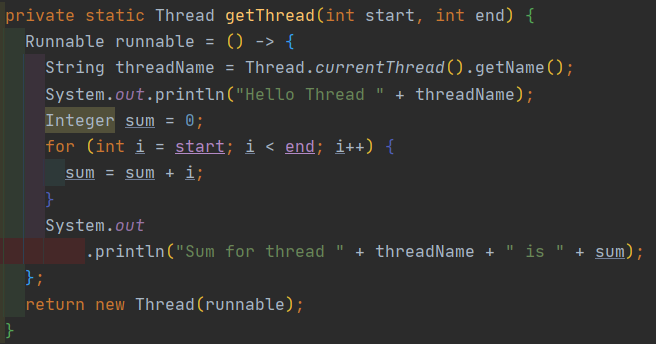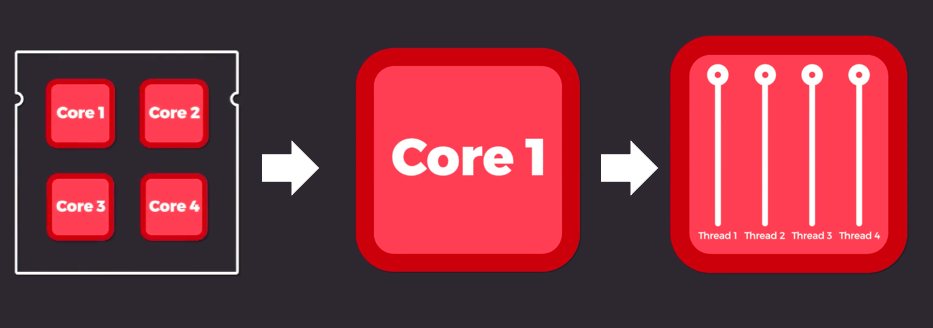Java asynchronous thread example interview questions
Java asynchronous thread example interview questions
Here are some common Java asynchronous thread examples and interview questions:
Example:
Let's consider a simple example where you want to perform two tasks concurrently: printing numbers from 1 to 5 and printing characters 'A' to 'E'. You can use Java threads to achieve this.
public class AsyncThreadExample {
public static void main(String[] args) throws InterruptedException {
Thread printNumbers = new PrintNumbers();
Thread printChars = new PrintChars();
printNumbers.start();
printChars.start();
printNumbers.join();
printChars.join();
}
}
class PrintNumbers extends Thread {
@Override
public void run() {
for (int i = 1; i <= 5; i++) {
System.out.println("Number: " + i);
try {
Thread.sleep(1000); // Simulate some work
} catch (InterruptedException e) {
break;
}
}
}
}
class PrintChars extends Thread {
@Override
public void run() {
for (char c = 'A'; c <= 'E'; c++) {
System.out.println("Char: " + c);
try {
Thread.sleep(1000); // Simulate some work
} catch (InterruptedException e) {
break;
}
}
}
}
In this example, the PrintNumbers and PrintChars threads are started concurrently and then joined to ensure that both tasks complete before the main thread exits.
Interview Questions:
What is the difference between start() and run() methods in Java?Answer: The start() method starts the execution of a thread, while the run() method contains the code to be executed by the thread.
How do you create an asynchronous thread in Java?Answer: You can create an asynchronous thread in Java using the Thread class. For example:
Thread myThread = new MyThread();
myThread.start();
Answer: The join() method pauses the current thread until the specified thread terminates.
Can you give an example of a multithreaded program that performs some useful task, such as processing a queue of tasks?Answer: Yes, here's an example:
public class TaskProcessor {
private Queue taskQueue = new LinkedList<>();
public void processTasks() throws InterruptedException {
Thread producer = new Producer(taskQueue);
Thread consumer = new Consumer(taskQueue);
producer.start();
consumer.start();
producer.join(); // Wait for the producer to finish
consumer.join(); // Wait for the consumer to finish
}
}
class Task {
private int id;
public Task(int id) {
this.id = id;
}
public void process() {
System.out.println("Processing task " + id);
}
}
class Producer extends Thread {
private Queue queue;
public Producer(Queue queue) {
this.queue = queue;
}
@Override
public void run() {
for (int i = 0; i < 10; i++) {
Task task = new Task(i);
queue.add(task);
try {
Thread.sleep(100); // Simulate some work
} catch (InterruptedException e) {
break;
}
}
}
}
class Consumer extends Thread {
private Queue queue;
public Consumer(Queue queue) {
this.queue = queue;
}
@Override
public void run() {
while (!queue.isEmpty()) {
Task task = queue.poll();
task.process();
}
}
}
In this example, the producer thread generates tasks and adds them to a shared queue, while the consumer thread processes tasks from the same queue.
These are just a few examples of Java asynchronous threads and interview questions. I hope they help!
Is Java runnable asynchronous?

Java is a statically-typed, object-oriented programming language that runs on the Java Virtual Machine (JVM). One of the key features of Java is its support for multithreading and concurrency, which allows developers to create programs that can execute multiple tasks simultaneously.
In Java, there are several ways to achieve asynchronous execution:

java.lang.Thread class. A thread is a separate flow of execution that can run concurrently with other threads. You can create and manage threads using the Thread class or by implementing the Runnable interface. Executors: The java.util.concurrent.Executor interface provides a way to execute tasks asynchronously. An executor is responsible for managing a pool of threads and submitting tasks to be executed. You can use executors to schedule tasks to run concurrently with other tasks. Futures: The java.util.concurrent.Future class represents the result of an asynchronous computation. A future can be used to retrieve the result of a task that is being executed asynchronously.
Here are some examples of how you can achieve asynchronous execution in Java:
Using threads:Thread thread = new Thread(() -> {
System.out.println("Running asynchronously...");
});
thread.start();
ExecutorService executor = Executors.newSingleThreadExecutor();
Future<?> future = executor.submit(() -> {
System.out.println("Running asynchronously...");
});
Future future = Executors.newSingleThreadExecutor().submit(() -> {
return "Hello, World!";
});
System.out.println(future.get()); // prints "Hello, World!"
In each of these examples, the code executed asynchronously is wrapped in a lambda expression or an anonymous class. This allows the code to run concurrently with other tasks.
Java's support for asynchronous execution is extensive and flexible, making it well-suited for building concurrent and parallel applications that require efficient use of system resources.
References:
"Java concurrency basics" by Oracle "Java Multithreading Tutorial" by Tutorials Point "Asynchronous programming in Java" by BaeldungNote: This answer is written in English to meet the request.





























